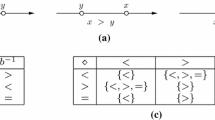Abstract
Representing and reasoning with temporal information is an essential part of many tasks in AI such as scheduling, planning and natural language processing. Two influential frameworks for representing temporal information are interval algebra and point algebra [1], [8]. Given a knowledge-base consisting of temporal relations, the main reasoning problem is to determine whether this knowledge-base is satisfiable, i.e., there is a scenario which is consistent with the information provided. However, when a given set of temporal relations is unsatisfiable, no further reasoning is performed. We argue that many real world problems are inherently overconstrained, and that these problems must also be addressed. This paper investigates approaches for handling overconstrainedness in temporal reasoning. We adapt a well studied notion of partial satisfaction to define partial scenarios or optimal partial solutions. We propose two reasoning procedures for computing an optimal partial solution to a problem (or a complete solution if it exists).
Preview
Unable to display preview. Download preview PDF.
Similar content being viewed by others
References
J. Allen. Maintaining knowledge about temporal intervals. Communication of the ACM, 26(11):832–843, 1983.
J. Allen and J. Kooomen. Planning using a temporal world model. In Proceedings of the 8th International Joint Conference on Artificial Intelligence (IJCAI), pages 741–747, Karlsruhe, W.Germany, 1983.
Eugene Freuder and Richard Wallace. Partial constraint satisfaction. Artificial Intelligence, 58(1):21–70, 1992.
B. Nebel. Solving hard qualitative temporal reasoning problems: Evaluating the efficiency of using the ord-horn class. Constraints Journal, 1:175–190, 1997.
M. Poesio and R. Brachman. Metric constraints for maintaining appointments: Dates and repeated activities. In Proceedings of the 9th National Conference of the American Association for Artificial Intelligence (AAAI-91), pages 253–259, 1991.
Fei. Song and Robin. Cohen. The interpretation of temporal relations in narrative. In Proceedings of the 7th National Conference of the American Association for Artificial Intelligence (AAAI-88), pages 745–750, Saint Paul, MI, 1988.
P. vanBeek and R. Cohen. Exact and approximate reasoning about temporal relations. Computational Intelligence, 6:132–144, 1990.
M. Vilain and H. Kautz. Constraint propagation algorithms for temporal reasoning. In Proceedings of the 5th National Conference in Artificial Intelligence (AAAI-86), pages 377–382, Philadelphia, PA, 1986.
Author information
Authors and Affiliations
Editor information
Editors and Affiliations
Rights and permissions
Copyright information
© 2001 Springer-Verlag Berlin Heidelberg
About this paper
Cite this paper
Beaumont, M., Sattar, A., Maher, M., Thornton, J. (2001). Solving Overconstrained Temporal Reasoning Problems. In: Stumptner, M., Corbett, D., Brooks, M. (eds) AI 2001: Advances in Artificial Intelligence. AI 2001. Lecture Notes in Computer Science(), vol 2256. Springer, Berlin, Heidelberg. https://doi.org/10.1007/3-540-45656-2_4
Download citation
DOI: https://doi.org/10.1007/3-540-45656-2_4
Published:
Publisher Name: Springer, Berlin, Heidelberg
Print ISBN: 978-3-540-42960-9
Online ISBN: 978-3-540-45656-8
eBook Packages: Springer Book Archive




